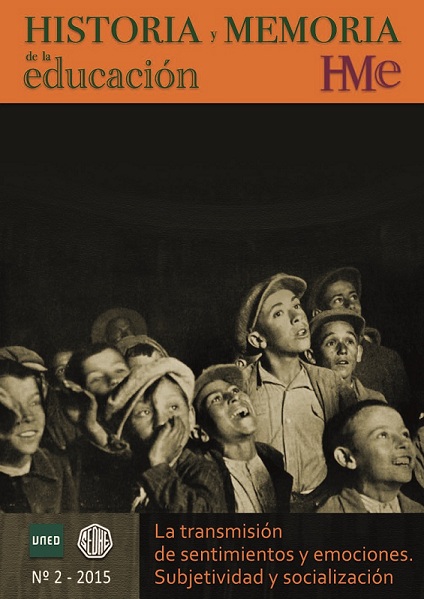Emociones y sentimientos en los procesos de socialización política: una mirada desde la historia de la educación
DOI:
https://doi.org/10.5944/hme.2.2015.15541Abstract
La investigación histórico-educativa actual responde también al giro afectivo de las ciencias incorporando las emociones y los sentimientos como categorías de análisis y variables a tener en cuenta en los procesos de enseñanza, aprendizaje, aculturación y socialización. La evidencia de que juegan un papel activo en los procesos cognitivos, evaluativos y axiológicos así como en la formación de identidades individuales y colectivas, obliga a los historiadores de la educación a examinar sus fuentes, contextos, sujetos y fenómenos prestando atención (o al menos no ignorando ni minusvalorando) estos componentes de la experiencia vital de todo ser humano en sus dimensiones personal y social. Esta introducción al monográfico ofrece una visión panorámica de la evolución histórica de la investigación sobre emociones y sentimientos focalizando principalmente en la psicología, la sociología y la neurociencia, sin olvidar su relevancia en la literatura, el arte y la política, para terminar profundizando en los sentimientos sociales que intervienen,influyen, moldean y son moldeados (o construidos, incitados, provocados, impuestos, sugeridos…) en los procesos de socialización política. La educación –formal, no formal e informal– en diferentes tiempos y contextos históricos, ha sido la vía privilegiada de transmisión de culturas sociopolíticas impregnadas de una heterogénea pero inevitable carga afectiva. Los artículos del monográfico muestran a través de la variedad de fuentes documentales, países, épocas y temáticas cómo las emociones y los sentimientos -ya sea implementados intencionadamente o simplemente actuando en los fenómenos de socialización política- son elementos centrales, y por tanto portadores de información relevante, en la configuración de recursos comunicativos, estrategias didácticas y fines educativos.
Downloads
##submission.downloads##
Pubblicato
Come citare
Fascicolo
Sezione
Licenza
Authors who publish in Historia y Memoria de la Educación agree to the following terms:
- Authors retain copyright and grant the journal right of first publication with the work simultaneously licensed under a Creative Commons Attribution-NonCommercial 4.0 International that allows others to share the work with an acknowledgement of the work's authorship and initial publication in this journal.
- Authors are able to enter into separate, additional contractual arrangements for the non-exclusive distribution of the journal's published version of the work (e.g., post it to an institutional repository or publish it in a book), with an acknowledgement of its initial publication in this journal.
- Authors are permitted and encouraged to post their work online (e.g., in institutional repositories or on their website) prior to and during the submission process, as it can lead to productive exchanges, as well as earlier and greater citation of published work (See The Effect of Open Access).









